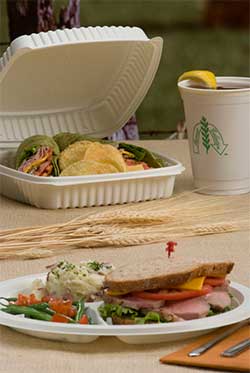I recently attended a sustainability packaging conference in sunny Florida. It was a decent conference for many reasons, not least of which was that it was around 70°F there and it was -2°F where I came from. Besides the weather however, I found it interesting to learn what some very prominent, household name companies were doing in terms of their sustainability efforts. Some companies had programs in place where nothing was left to waste. Things that would normally be tossed away were either reused, turned into something else or outlets were found where other companies or individuals might use whatever it was. The practices by some of these companies would rival the Inuit Eskimos in leaving nothing to waste.
But the real reason I was there was to attend the seminars on bioplastics and more specifically, bioplastics for food packaging. No question there are  some pretty neat technologies being worked on. Most folks are aware of PLA and blended PLA resins. Our Harvest products are produced from a blended PLA resin. But there are some other substrates being developed that, if successful, will increase the functionality of products, especially in the food service packaging world. Rest assured that your friends at Genpak will stay abreast of every new development that may give our customers that edge they need to stay competitive.
some pretty neat technologies being worked on. Most folks are aware of PLA and blended PLA resins. Our Harvest products are produced from a blended PLA resin. But there are some other substrates being developed that, if successful, will increase the functionality of products, especially in the food service packaging world. Rest assured that your friends at Genpak will stay abreast of every new development that may give our customers that edge they need to stay competitive.
What struck me though was, even at an event like this, there were people who don’t fully understand the magnitude of the marketing claims they make about their products. All sorts of wild claims were made that in one expert’s opinion within the audience sounded “too good to be true”. Claims ranged from biodegredation in landfills to marine environments to backyard compost bins. I won’t bother getting into the whole landfill biodegredation claim. You can look up those facts on your own. My point here is that without question, you must do your homework before you believe any “green” claim. If a company cannot provide legitimate third party verification by a reputable organization, you simply should not believe the claim. It really comes down to that. At some point the government or some other ruling body will step in and lay down rules regarding green claims. It’s my guess that some “eco-products” will start to disappear faster than my NCAA bracket picks.
So, if you’ve gained nothing else from this post other than I’m rotten at picking NCAA brackets, do yourself a favor and do the homework. Demand a third part verifying letter from a real and reputable organization like the BPI and not something written by a company official. It will weed out who you can trust and who you can’t.
